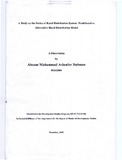A study on the status of rural distribution system: traditional vs alternative rural distribution model
Abstract
Most marketers realize that Bangladesh is on the change, economy is vibrant, incomes are rising; and the habits, preferences and attitudes are changing rapidly. There is, thus, an emerging need to build expertise in rural marketing. There are three challenges that a rural marketer must overcome. First is the challenge of reach - markets are small and scattered, second is the awareness of brand and the third one is influence. Across product categories, rural penetration and awareness remain low. The need is not just to reach or communicate but to actually influence consumption and buying behavior. There have been many innovative projects which have been attempted to address these challenges, like Joyeeta of Interspeed advertising which is directly backed by Unilever Bangladesh, Project Aparajita of CARE Bangladesh, WEB - BATA of Women Entrepreneurs of Bangladesh, and Project SHIKHA of Consumer Connect Communication Ltd. These initiatives leverage micro enterprises for women making them Direct to home distributors. The women entrepreneurs directly interact with the consumers not just selling or distributing a product, but educating consumers on the brand benefits and why they should use a particular brand. This process called alternative rural distribution system.
This study revealed important insights on both the traditional and alternative rural distribution system and the impacts of alternative rural distribution system on rural people. Basically alternative rural distribution system is operating in such area where traditional distribution does not operate. Rural people are getting more benefited under the alternative distribution system than under the previous traditional distribution system and rural women are empowered and generating income from the trade.
The study focused on finding out the strengths, weaknesses and effectiveness of the alternative rural distribution system and the traditional distribution system in rural Bangladesh. In order to assess the effectiveness of these two systems households and retail outlets were interviewed. The general assumption was that the alternative rural distribution systems change the habit of rural people and their buying pattern, and compare the effectiveness of the systems by the retailers. For this purpose structured questionnaires were used to explore the insights of rural people. FGDs were conducted to get essence of the reality.

